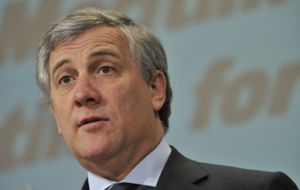MercoPress. South Atlantic News Agency
EU challenges and opportunities with Mercosur and Latin America
 Antonio Tajani is vice-president of the European Commission, as well as the commissioner for Industry and Entrepreneurship
Antonio Tajani is vice-president of the European Commission, as well as the commissioner for Industry and Entrepreneurship By Antonio Tajani - The challenges and opportunities in Latin America are dear to my heart. This is the first time in many years that a European Commissioner for industry heads to the region. And it is not by chance that I strongly wished to go, as this was a priority set in my new mandate.
Over the past few years, Latin America has emerged as a strategic and very dynamic economic player. Thus, I want to give a clear signal about the increasing importance that Europe attaches to economic and industrial ties with the continent. The shared values of our history, religion and culture should lead us to boost our political and trade co-operation.
The European Union is Mercosur’s number one trading partner (second for Latin America).
With 530 million people, the South American market was growing at over 5% a year before the economic crisis and is returning to similar levels today. The figures for 2010 are impressive: 164 billion Euros (6.2% of total EU trade) for goods and services. Europe exports industrial products like machinery, transport equipment and chemicals. Our companies are the first investors in the area with 315.5 billion Euros, 39% of the region’s total (2009).
Although Chile successfully concluded a free trade agreement with the EU (2003), Europe and the Mercosur countries are still looking for an inter-regional Association Agreement since 1999. In May 2010, at the Madrid conference, both parties expressed their willingness to re-launch the negotiating process for an ambitious and balanced result going beyond the respective WTO obligations. It would be in our common interest to facilitate this process toward a stronger economic integration, from which other Latin and Central American countries are already benefiting.
Europe has a vocation for open and fair trade, with more freedom of access to markets for industrial products and raw materials. But we also believe in reciprocity and a common level playing-field. I’m sure Latin American countries share the same views.
This visit will be an opportunity to promote and deepen our common work, particularly in the regulatory and standards domains. The more we set common standards at international level, the better for our industry. And I also wish to exchange experiences and views on industrial policy to enhance the mutual interest for stronger industrial relations and trade.
Current initiatives
There are several initiatives that the Commission is currently working on.
In the field of SME (small and medium-sized enterprise) policy, I am particularly interested in creating a more co-ordinated effort and to have regular exchanges of views on our respective policies, which could result in a “dialogue SMEs.” There are still many untapped opportunities for SMEs in fields such as innovation, public services and access to finance.
In line with the Madrid declaration, we should strengthen our co-operation in the field of R&D (research and development) and industrial innovation. This is the key to facing common challenges such as sustainable growth and climate change. I’m in favour of increasing the participation of Latin American stakeholders in EU research programmes and technology transfer activities.
Last week, together with representatives from the French, Italian, Lithuanian, Portuguese and Spanish governments, and the counterparts of Argentina, Brazil and Chile and several European air carriers and tour operators, we launched the “50,000 tourists” pilot scheme starting in 2012. It is a symbol of our willingness to give the tourism industry a concrete boost during low season. This co-operation aims to create mutually beneficial solutions in which each partner is a winner.
We want to develop greater co-operation for raw material policy, as Argentina, Brazil and Chile are major exporters of products such as borates and lithium. All industrialized countries, emerging or developing, need and, in one way or another, are all dependent on supply from other countries. These countries have expressed a genuine interest in increasing their bilateral trade and investment with the EU which should generate growth and employment.
I also want to establish industrial co-operation for the satellite navigation programmes and particularly for Galileo (GNSS - Global Navigation Satellite Systems). The applications impact on many areas such as transport, agriculture, environment, energy communication networks and security. It is crucial to highlight Latin American expertise in the field of space and earth observation, in particular GEOSS (Global Earth Observation System of Systems), in order to develop a space dialogue.
Innovation & entrepreneurship
I’m strongly convinced that Europe needs Latin America as much as Latin America needs Europe. Our relations should focus on high-impact activities which can be used to leverage investments and accelerate market integration. To provide quality services and infrastructure, to foster a spirit of innovation and entrepreneurship are the main challenges which should be met.
- Tajani is currently on a tour of South America: Chile, Argentina and Brazil. However the Argentine leg was cancelled because of the ash cloud impeding flights to Argentina and Uruguay.




Top Comments
Disclaimer & comment rulesCommenting for this story is now closed.
If you have a Facebook account, become a fan and comment on our Facebook Page!